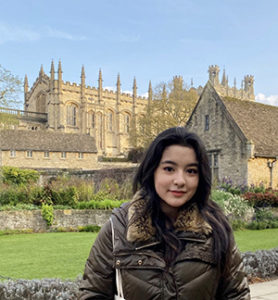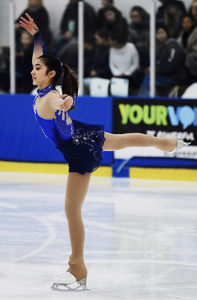Class of 2020: IU East’s youngest graduate Kiki Pichini will use mathematics background for a future in business analytics
Kiki Pichini started working on her Bachelor of Science in Mathematics from Indiana University East before she had her driver’s license.

Kiki Pichini received her Bachelor of Science in Mathematics this May. Pichini, IU East’s youngest graduate for the Class of 2020, is ready to pursue graduate work and eventually business analytics.
At age 15 Pichini started the mathematics degree online in fall 2018.
Now 16 years-old Pichini is the youngest graduating student in the Class of 2020.
Pichini lives in East Wenatchee, Washington, with her parents, Tom Pichini and Terumi Hoshi. The small town is located at the center of the state, about two and a half hours west of Seattle.
The first confirmed case of the coronoavirus (COVID-19) in the United States was in Washington as recorded by the Center for Disease Control January 2020. Pichini said the impact of the virus was hectic at first, but by late April had started to quiet down for the town of about 14,000. She added many people were preparing for the fruit season ahead. East Wenatchee is home to one of the largest shippers of sweet cherries and nearby Wenatchee, is the “apple orchard capital of the world.”
Before joining IU East’s math program, Pichini was a full-time figure skater.
At 12 years old Pichini was training at the U.S. Olympic Training Center in Colorado Springs, Colorado.
After the family moved to Colorado and Pichini was training, she continued her studies through homeschooling.
“Skating was really a serious thing at that time,” she said.

Kiki Pichini is a former figure skater. She trained at the U.S. Olympic Training Center in Colorado Springs, Colorado, while homeschooling and working on her associate’s degree in mathematics.
An injury led her to find new ways to challenge herself while she was recuperating.
“I was always pretty good at math as a kid, but I studied more for the SAT while I was injured,” Pichini said. “I took the SAT, and my goal was to get the John Hopkins Center for Talented Youth Grand Award, for youth under 13 who get over 700 out of 800 on one of the sections.”
According to its website, the John Hopkins Talent youth program is a nonprofit organization dedicated to identifying and developing the talents of academically advanced pre-college students around the world. Located in Baltimore, Maryland, the program serves bright learners through research, advocacy, counseling, and its gifted and talented programs.
Pichini did well on the SAT, and used her score to enroll at Pikes Peak Community College for the associate degree in math.
“Originally I was taking one class a semester. It was something I did on the side to maybe learn some extra math while continuing to learn to skate,” Pichini said. “Once I started I realized I really enjoyed it and I just wanted to finish the degree. So I went from taking one class, to two classes to four classes, and eventually while taking classes during the summer, I ended up finishing my degree on time.”
After community college, she moved with her family to East Wenatchee. She has continued skating, but isn’t as involved as she once was because of the virus and her studies.
“I’ve done competitions in Washington and Oregon since I’ve moved here,” Pichini said. “I have done a few local shows here. I’ve had a few solos in The Winter Ice Gala which is a big thing they do here at our local rink, and some Christmas shows.”
She decided she wanted to continue and earn her bachelor’s degree. The closest four-year college she could find in Washington was over 90 minutes away.
“I was 14 at the time, so I was too young to get my driver’s license and it was unrealistic for my parents who were setting up a business here to drive over three hours away, so I couldn’t do that,” she said.
Faced with the decision to either take a break from pursuing a bachelor’s degree or finding an online program, Pichini researched online math degree programs and found IU East.
“I decided IU East was my best fit because of a combination of the faculty, the courses they offered, and the timing worked out for me,” Pichini said.
IU East’s online mathematics program was a good fit and she feels prepared for her next steps as a graduate. She studied several areas of math, and had the opportunity to branch out into other areas through electives including English, philosophy and politics, something she hadn’t had an opportunity to do before taking classes at IU East.
“Since I was so young, I just went with what I was good at and what I enjoyed, and as a 12 year old that’s how I chose my major. What more could you ask for,” she said with humor. “I think through these courses I’ve had a better idea of what I want to go after, more than just pure math.”
Pichini wants to study the connection of policy, technology and finance, and how her mathematics education intersects with these areas.
“There were a lot of classes I enjoyed in proof based math and more applied math, like finance and statistics,” Pichini said.
While continuing her studies online, Pichini sought extra challenges to enhance her mathematics skills. The IU East faculty helped her with recommendation letters for summer projects and graduate school.
Ramesh Karki, assistant professor of mathematics at IU East, taught Pichini online.
“I was really impressed with Kiki when I knew that she was 15 years old, taking Introduction to Modern Algebra with me and requesting for a letter of recommendation for applying to some prestigious math summer programs to work with good mathematicians,” Karki said. “She was accepted to one of them. There, she completed a research project and prepared a manuscript, which is now under review. I am very happy that I taught Kiki, a highly motivated and actively engaged student, in three proof-based math courses and had an opportunity to recommend her in prestigious graduate math programs. I wish all the luck for her future endeavor.”
The summer project was an opportunity to work with Professor Adam Sheffer from the City University of New York. He mentored her on a research paper on combinatorics, An Upper Bound for the Number of Rectangulations of a Planar Point Set.
Through the experience, she learned how to think more abstractly and outside of the box, how to compile research, and writing for academic journals. They worked on the paper through email and online meetings, she said.
“I lowered an upward bound for the number of rectangulations from what it was in 2006,” Pichini said. “It was original research for me.”
Pichini completed the Combinatorics paper while continuing a full summer semester at IU East.
“It was difficult as far as time management but I learned so much from that experience, and I am grateful for it,” Pichini said.
Her paper is accessible online through Cornell University’s arXiv at https://arxiv.org/abs/1911.09740. She recently submitted her paper to a journal, Computational Geometry: Theory and Applications, for publication. “I’m really excited about that,” she said.
Markus Pomper, associate professor of mathematics and chair of the program at IU East, has also taught Pichini online.
“Kiki is an outstanding student, very driven to succeed and to be perfect. This also shows in her grades and in the quality of the assignments she completed as part of her courses,” Pomper said. “In the senior seminar, she talked about a very difficult problem, and was able to field her peers’ ad-hoc questions.”
Pomper looks forward to where Pichini may go next with her studies. “She is a native speaker of Japanese and also speaks Spanish, having lived in Panama for some years. She is applying for graduate schools, and has her sights set on prestigious universities abroad, unless COVID nixes those plans.”
Pichini, because of her unique situation, has many friends in high school and college who have had to transition to online classes due to the virus.
“There’s this perception that online classes are easy, but in reality they test your skills for time management and self-motivation because there’s no one to tell you to do things, to tell you an assignment is due or to get to class,” she said.
“Really to get the most out of school you have to watch the videos or lectures the faculty post, you have to work on your assignments every day so they aren’t forgotten, or doing everything the last minute,” Pichini added.
Pichini is planning on going to graduate school but is not yet decided where she would like to go, and depending on the virus, may go this fall or wait a year. She plans to continue figure skating on the side to take her mind off of academics and to have another focus. “It’s about a good balance for me,” she said.
For the future, Pichini would like to apply her math skills and experience in working with blockchain programming and crytocurrency.
“Basically, that’s what I do on the side,” Pichini said.
She would like to apply her knowledge in mathematics to fields in finance or technology by attending graduate school. She’s also thinking about law school so she can connect the fields through policy.
“I’m looking forward to studying business analytics and its component parts of finance and economics as a degree program that will allow me to do those things. I think I can really apply my mathematics degree from the IU East to the field, too,” Pichini said.

